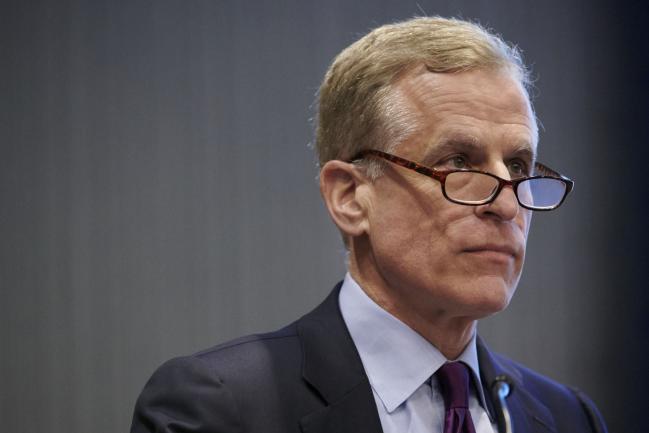(Bloomberg) -- Federal Reserve Bank of Dallas President Robert Kaplan said he dissented at the central bank’s September meeting so that future policy makers wouldn’t be forced to keep rates near zero.
“I would like future committees to have the flexibility to adapt to those future economic conditions so they can use their best judgment in deciding on the appropriate stance of monetary policy,” Kaplan wrote in a letter published Tuesday.
The letter outlines his rationale for dissenting as well as his views on the economy and energy markets. Kaplan also said he’s skeptical about the benefits of additional forward guidance right now.
Kaplan sees the economy contracting 3% this year and growing 3.5% next year. The core personal-consumption inflation rate will rise 1.6% at the end of this year and 1.8% by the end of next year. The unemployment rate will fall to 5.7% by the end of 2021.
Kaplan was one of two dissenting voters at the Fed’s Sept. 15-16 meeting, where policy makers took a more dovish tone. They signaled rates would stay near zero through 2023 and adapted their post-meeting statement to reflect their new strategy of allowing inflation to rise above 2% after periods of under-performance.
Minneapolis Fed President Neel Kashkari dissented in favor of waiting for a rate hike until “core inflation has reached 2% on a sustained basis.”
Kaplan said he expects it’ll be appropriate to keep interest rates near zero until the economy is on track to achieve maximum employment and inflation averaging 2% over time, which will take until late 2022 or “sometime in 2023.” As the economy approaches those benchmarks, keeping rates near zero may mean that policy actually becomes more accommodative, he wrote.
“I can understand why future committees will want to remain accommodative at that point in order to ensure we achieve our goals, but will they want to be effectively increasing the level of accommodation by keeping the federal funds rate at zero?” Kaplan wrote. “I would like future Committees to have the flexibility to make this judgment.”
He also said that low rates punish savers and encourage greater risk-taking, creating distinctions in financial markets. Kaplan votes on this year’s policy-setting Federal Open Market Committee but the Dallas Fed won’t again until 2023 under the reserve bank rotation system.
Read more: Fed’s Kaplan, Wary of Bubbles, Dissented to Preserve Flexibility
Kaplan said officials learned in the last recovery that the unemployment rate can fall much lower than previously expected without triggering excess inflation, and that a such a tight labor market can bring previously sidelined workers back.
The coronavirus pandemic has hit these individuals the hardest, Kaplan wrote. The Black and Latino unemployment rates climbed to much higher levels than that of White Americans during the height of the crisis, and remain at elevated levels today.
“These disparities are indicative of how the pandemic has disproportionately impacted person-to-person service sector jobs, and those with lower levels of educational attainment,” Kaplan wrote. “These statistics reinforce the need for greater efforts to invest in education and skills training in order to create a stronger and more inclusive labor market and help ensure that key groups of our society are not left behind in this recovery.”
He added that if Congress doesn’t continue the additional unemployment benefits, which had supported consumer spending during the early months of the pandemic, and other fiscal stimulus it would “certainly create headwinds for continued recovery.” Kaplan said support for state and local governments is also essential, as is helping small- and mid-size businesses access capital.
The Dallas Fed’s district encompasses the world’s largest shale-oil field, which has seen a huge decrease in production as energy demand disappeared this year. Kaplan estimates that production in the Permian Basin will decline to 3.8 million barrels per day in December, from 4.7 million barrels per day last year. The U.S. overall will see a decline to 10.7 million barrels per day from 12.8 last year.
Completed wells will decline 50% this year, and U.S. capital spending on exploration and development will drop by the same amount. Kaplan said oil production should be flat next year.
©2020 Bloomberg L.P.

